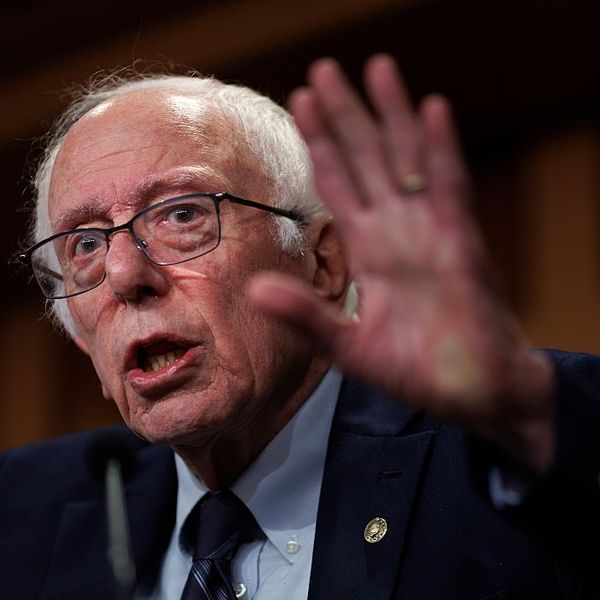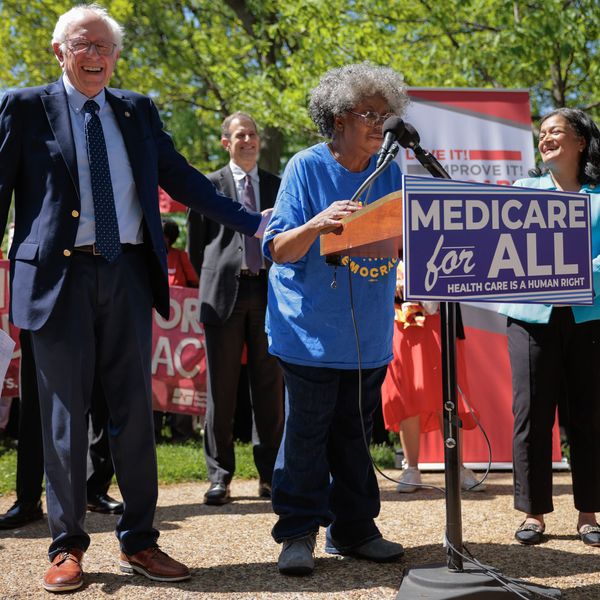Obama's Reprehensible Rhetoric Against Single-Payer
When Barack Obama gave his "this is it" speech on health care reform
on March 3, he once again swerved out of his way to hit advocates of a
single-payer system.
He said: "On one end of the spectrum, there are some who have
suggested scrapping our system of private insurance and replacing it
with government-run health care. Though many other countries have such
a system, in America it would be neither practical nor realistic."
When Barack Obama gave his "this is it" speech on health care reform
on March 3, he once again swerved out of his way to hit advocates of a
single-payer system.
He said: "On one end of the spectrum, there are some who have
suggested scrapping our system of private insurance and replacing it
with government-run health care. Though many other countries have such
a system, in America it would be neither practical nor realistic."
You can argue about whether it is realistic politically but there
should be no question whatsoever that it's practical in the sense of
being functional. It works well in other countries, including Canada,
and there is no reason it can't work well here. Canada's health
outcomes, and the health outcomes of every other advanced industrial
country with government-run systems, are superior to ours.
Maybe Obama was using the "neither, nor" construction to try to
strengthen his weak and illogical opposition to single-payer and even
to a robust public option like Medicare for all who want it--and 65
percent of the American people do want that kind of a public option.
There is not that much difference between "practical" and
"realistic" if by both he meant to say politically possible. I suppose
he could have really stretched the sentence out by saying
"government-run health care . . . would be neither practical nor
realistic nor feasible nor possible nor doable nor achievable nor
viable." But it would all mean the same thing. At bottom, he didn't
want to expend any political capital for it, or even for the robust
public option.
Instead, he exploited advocates of a single-payer system as a foil
to say, in not so many words, "I'm not an extremist like they are."
He juxtaposed them with Republicans who want to "loosen regulations
on the insurances companies." And he did so in order to try to claim
the middle ground, on the false and facile assumption that the middle
ground is always the best ground.
Here's how he put it: "I don't believe we should give government
bureaucrats or insurance company bureaucrats more control over health
care in America."
By damning "government bureaucrats," Obama played right into the
hands of the anti-government crowd and made any durable expansion of
health care coverage all the more difficult. He also insulted every
single federal employee in the Medicare and Medicaid and VA and Indian
health programs.
This was reprehensible rhetoric.
An Urgent Message From Our Co-Founder
Dear Common Dreams reader, The U.S. is on a fast track to authoritarianism like nothing I've ever seen. Meanwhile, corporate news outlets are utterly capitulating to Trump, twisting their coverage to avoid drawing his ire while lining up to stuff cash in his pockets. That's why I believe that Common Dreams is doing the best and most consequential reporting that we've ever done. Our small but mighty team is a progressive reporting powerhouse, covering the news every day that the corporate media never will. Our mission has always been simple: To inform. To inspire. And to ignite change for the common good. Now here's the key piece that I want all our readers to understand: None of this would be possible without your financial support. That's not just some fundraising cliche. It's the absolute and literal truth. We don't accept corporate advertising and never will. We don't have a paywall because we don't think people should be blocked from critical news based on their ability to pay. Everything we do is funded by the donations of readers like you. Will you donate now to help power the nonprofit, independent reporting of Common Dreams? Thank you for being a vital member of our community. Together, we can keep independent journalism alive when it’s needed most. - Craig Brown, Co-founder |
When Barack Obama gave his "this is it" speech on health care reform
on March 3, he once again swerved out of his way to hit advocates of a
single-payer system.
He said: "On one end of the spectrum, there are some who have
suggested scrapping our system of private insurance and replacing it
with government-run health care. Though many other countries have such
a system, in America it would be neither practical nor realistic."
You can argue about whether it is realistic politically but there
should be no question whatsoever that it's practical in the sense of
being functional. It works well in other countries, including Canada,
and there is no reason it can't work well here. Canada's health
outcomes, and the health outcomes of every other advanced industrial
country with government-run systems, are superior to ours.
Maybe Obama was using the "neither, nor" construction to try to
strengthen his weak and illogical opposition to single-payer and even
to a robust public option like Medicare for all who want it--and 65
percent of the American people do want that kind of a public option.
There is not that much difference between "practical" and
"realistic" if by both he meant to say politically possible. I suppose
he could have really stretched the sentence out by saying
"government-run health care . . . would be neither practical nor
realistic nor feasible nor possible nor doable nor achievable nor
viable." But it would all mean the same thing. At bottom, he didn't
want to expend any political capital for it, or even for the robust
public option.
Instead, he exploited advocates of a single-payer system as a foil
to say, in not so many words, "I'm not an extremist like they are."
He juxtaposed them with Republicans who want to "loosen regulations
on the insurances companies." And he did so in order to try to claim
the middle ground, on the false and facile assumption that the middle
ground is always the best ground.
Here's how he put it: "I don't believe we should give government
bureaucrats or insurance company bureaucrats more control over health
care in America."
By damning "government bureaucrats," Obama played right into the
hands of the anti-government crowd and made any durable expansion of
health care coverage all the more difficult. He also insulted every
single federal employee in the Medicare and Medicaid and VA and Indian
health programs.
This was reprehensible rhetoric.
When Barack Obama gave his "this is it" speech on health care reform
on March 3, he once again swerved out of his way to hit advocates of a
single-payer system.
He said: "On one end of the spectrum, there are some who have
suggested scrapping our system of private insurance and replacing it
with government-run health care. Though many other countries have such
a system, in America it would be neither practical nor realistic."
You can argue about whether it is realistic politically but there
should be no question whatsoever that it's practical in the sense of
being functional. It works well in other countries, including Canada,
and there is no reason it can't work well here. Canada's health
outcomes, and the health outcomes of every other advanced industrial
country with government-run systems, are superior to ours.
Maybe Obama was using the "neither, nor" construction to try to
strengthen his weak and illogical opposition to single-payer and even
to a robust public option like Medicare for all who want it--and 65
percent of the American people do want that kind of a public option.
There is not that much difference between "practical" and
"realistic" if by both he meant to say politically possible. I suppose
he could have really stretched the sentence out by saying
"government-run health care . . . would be neither practical nor
realistic nor feasible nor possible nor doable nor achievable nor
viable." But it would all mean the same thing. At bottom, he didn't
want to expend any political capital for it, or even for the robust
public option.
Instead, he exploited advocates of a single-payer system as a foil
to say, in not so many words, "I'm not an extremist like they are."
He juxtaposed them with Republicans who want to "loosen regulations
on the insurances companies." And he did so in order to try to claim
the middle ground, on the false and facile assumption that the middle
ground is always the best ground.
Here's how he put it: "I don't believe we should give government
bureaucrats or insurance company bureaucrats more control over health
care in America."
By damning "government bureaucrats," Obama played right into the
hands of the anti-government crowd and made any durable expansion of
health care coverage all the more difficult. He also insulted every
single federal employee in the Medicare and Medicaid and VA and Indian
health programs.
This was reprehensible rhetoric.

